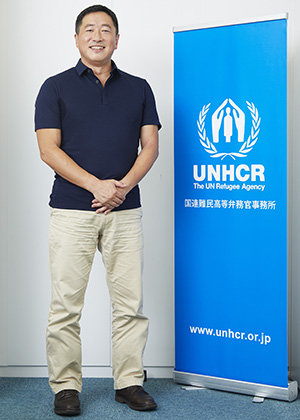Senior Liaison Associate, United Nations High Commissioner for Refugees (UNHCR) Representation in Japan
1994 B.A., Division of Social Sciences (then), College of Liberal Arts
1996 M.A. in ICU Graduate School of Public Administration
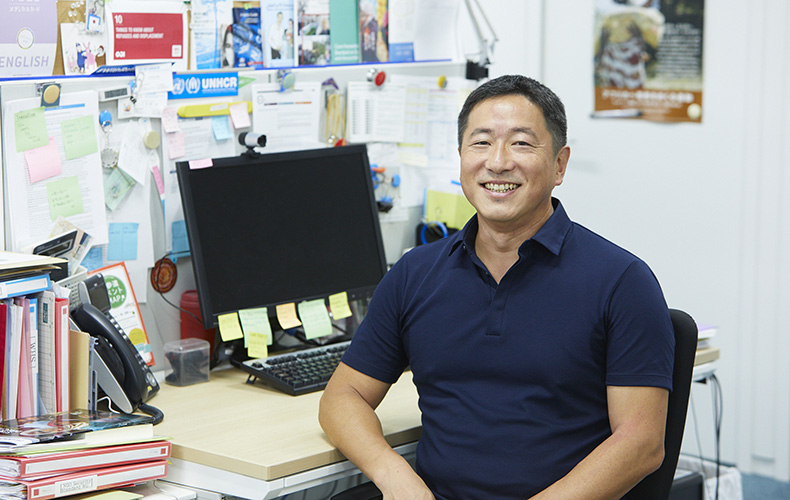
As a member of an organization supporting refugees at the forefront
The main missions of the Office of the United Nations High Commissioner for Refugees (UNHCR) are to secure international protection for refugees who have been forced by conflicts and persecutions to flee their homelands and to lead and coordinate international efforts toward solving refugee problems. We are making every effort to protect the rights and dignity of refugees, enable everyone to exercise their rights to seek asylum and be safely protected, and ensure that they can voluntarily choose to return to their countries of origin or settle in the countries of asylum or third countries. UNHCR have supported about 68 million people (as of the end of 2016) across the world, including refugees, stateless people, internally displaced people and returnees.
The term "refugee" generally refers to people who have been forced to leave their countries of origin due to conflicts and/or human rights abuse and cannot receive protection from their own government. Unlike disaster victims who have been displaced due to natural disasters or other incidents, refugees cannot receive support from their own government. Nor, unlike migrant workers who migrate to make a better living, can they return home when they want to or seek support from their homeland embassies. Refugees are placed in an extremely unstable position. UNHCR has been mandated by the UN General Assembly to lead and coordinate efforts to protect them. It is the mission of the UNHCR and humanitarian NGOs that are active across borders to be at the forefront of protecting refugees.
I am a member of the External Relations Unit of UNHCR Representation in Japan. We regularly report the activities of UNHCR to stakeholders and shares frontline information with them. The main purpose of these activities is to build and enhance a network of partners who support UNHCR's efforts in various ways, so that we can mobilize resources (including funds, human resources, supplies, knowledge and technologies) held by the Japanese government and private sectors and effectively utilize them at the forefront of refugee protection and humanitarian assistance. At present, I am focusing on building partnerships with NGOs and civil societies, as well as advocacy activities to improve refugee protection and humanitarian aid environment.
To give an example, I worked together with civil societies to make policy recommendations to the Japanese government in the formulation of the National Action Plan (NAP) for the implementation of UN Security Council Resolution 1325 on Women, Peace and Security, which calls for the participation of women in conflict prevention and peacebuilding activities and points out to the importance of protecting women and accommodating their specific needs in situations of armed conflicts. We recommended that the Japanese NAP should reflect the viewpoints of refugee protection and gender mainstreaming in humanitarian assistance activities. Protection and empowerment of women is also considered an important element in the Priority Policy for Development Cooperation of the Japanese government. In this context, I would like to demonstrate the proximity between UNHCR's operations and Japan's foreign aid policies to enhance fund raising opportunities by highlighting UNHCR's field activities to protect women and children.
UNHCR and NGOs have realized multilayered partnerships at all levels from global to field level and multifaceted partnerships not only in humanitarian assistance projects but also in activities such as setting protection criteria and deployment of emergency response personnel. UNHCR Representation in Japan serves as the secretariat for Japan Forum for UNHCR and NGOs (J-FUN), which provides a regular consultations with various NGOs to share information to strengthen field collaboration and engage in activities to enhance project implementation capacities and humanitarian environment. Examples of recent activities that I have engaged in include joint development of safety standard guidelines with NGO members to improve safety management capabilities in dangerous areas, and training provided by the UNHCR Regional Centre for Emergency Preparedness (eCentre).
Other than these Tokyo-based missions, I was also sent to Yumbe in northern Uganda as a member of an Emergency Response Team (ERT) to support refugees from South Sudan from September to December 2016. UNHCR staff from across the world apply for ERT and the Emergency Response Section of the headquarters selects its members. When selected as a team member, you will undergo a training program to check your eligibility as an ERT member. You will have to stay prepared at all times so you can be dispatched within 72 hours whenever you receive a notice of calling. After I arrived in Yumbe, I prepared an indicator report in addition to daily and weekly reports to transmit information on the protection and support activities UNHCR was carrying out. Other tasks included managing coordination meetings between UNHCR, NGOs and government agencies, building a network of support personnel, responding to inspections by donor countries and the media, and transporting refugees from Reception Centres to settlements and providing livelihood support.
The thrill of working at UNHCR is to literally be there to help the refugees and to build the frameworks for problem solving at the forefront together with partners and the refugees themselves. The act of "helping" someone may seem clear and simple, but actually it is complicated. Sharing the recognition of "who, where, when, how and how much" to help and acting accordingly require a great deal of sincere effort and dialogue. There are various uncertainties and restrictions entangled in the field concerning funding, human resources, infrastructure, security situations and numerous actors to collaborate with. Working to realize the most efficient and effective support with limited resource (money, people, time, etc.) when there is no given "correct answer" - that is what humanitarian aid is all about.
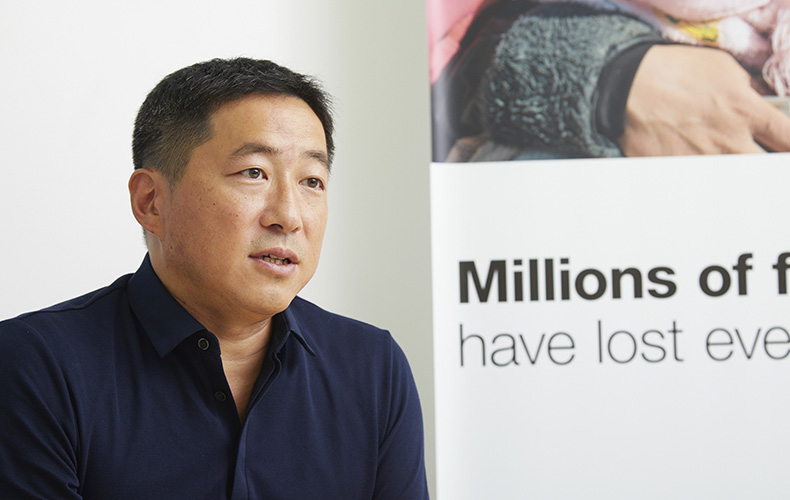
The philosophy of liberal arts has formed the basis of my career
I naturally came to know ICU because many of my family members and relatives including my mother and aunt were ICU graduates. I remember how I was attracted to the open atmosphere when I visited the campus.
What I learned in ICU is becoming increasingly important for me over time. I studied international law and international organization theory as an undergraduate and graduate school student under the tutelage of Professor Toshiki Mogami. I learned about the basics of relation between sovereign states and human rights and the mechanisms of United Nations and other international organizations. I never imagined in those days, but the fundamental knowledge I gained back then has enabled me to attain a deeper and multifaceted understanding of the environment surrounding refugee protection and humanitarian aid today. I also learned in Professor Mogami's classes and seminar that academic learning is not about accumulating knowledge but the guidepost to understand the world and change it for the better, and therefore, we need to be "faithful to knowledge" (which I still remember with a humble heart).
I also gained some valuable experiences in Professor Hiroaki Matsuzawa's class I took at ICU's graduate school. Through lectures, he taught us the importance of doing discussions within our capacity and knowledge--not in a know-it-all attitude. I also learned that basic practice to acquire knowledge and believing our own subtle feelings and daily senses in discussions were also essential. This means that sincerely examining your own experiences and senses, and putting them into words will eventually lead to discussions of universal significance. This attitude of valuing one's common sense is one thing I keep in mind when communicating with representatives of local governments, authorities, UN organizations, NGOs and the refugees. It is important to start a dialogue from what we both know well, rather than to engage in discussions based on lofty ideals and incomprehensible high-level theories.
Looking back, I think liberal arts education was just what I needed. In the field of international assistance, you are often required to "show a man how to catch fish rather than give him a fish." I think this has something in common with the philosophy of liberal arts. In liberal arts, you don't just receive knowledge, but the emphasis is placed on the process of getting the knowledge.
UNHCR is an organization that requires a generalist approach than a specialist one. For example, when you want to support refugee women and children, you must take into consideration a wide range of aspects from refugee registration, prevention of sexual violence and provision of care when an assault occurs, health, clean water and hygiene, education, food and other supplies, to mobilization of the refugee community. Of course, at times, you are required of a high level of expertise but you cannot rely on one specific area of knowledge to solve all the problems. You need to maintain a wide perspective. In this sense, what I learned in ICU, in other words, my experience of learning "how to widen my knowledge" and "the process of getting knowledge" has formed the basis of my career.
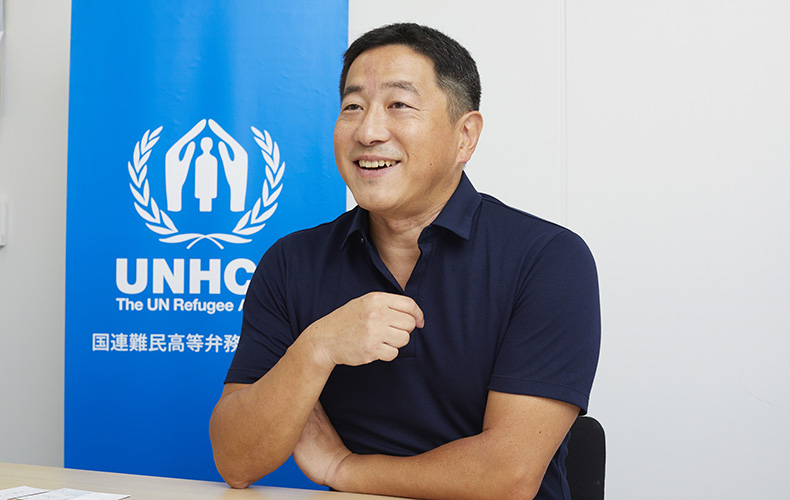
It's what you do, not your attributes that counts in ICU and in UN organizations
One of the characteristics of ICU is its long held culture of "evaluating people by what they do and not their attributes." I always felt that, in ICU, information like where you are from or what high school you attended has got nothing to do with how people see you, but your values are determined based on what you discuss and how you act. I feel the same atmosphere in UN organizations. What counts is not the name of the university you graduated or what degrees you have earned. At UNHCR, people evaluate you based on how you interact with refugees and identify their needs, or what you discuss with your colleagues to come up with possible support. There are many ICU graduates working at UN organizations, but very often, I spend quite a long time working with other staff members before finding out that they are fellow alumni.
I think that becoming a UN staff member is a means and not a purpose. I'm not trying to deny someone's aspiration to become a UN staff member, but aspirations "to promote social participation of women,", "to improve mental health of children," or "to tackle poverty by utilizing information technology," for example, should come first. Depending on the kind of aspiration you have, there are cases in which choosing to join a business enterprise or NGO would be more appropriate to achieve your aspiration. Moreover, what kind of tool you have to engage and interact with society in order to make the world a better place is much more important than what organization you belong to. My colleagues from overseas have really diverse backgrounds and past careers. Some used to work in NGOs and others came from academic fields. I even have a colleague who finally settled in UNHCR after living a vagabond life. But what they all have in common is the attitude of searching for "how I can contribute to solving this humanitarian crisis with my knowledge and skills."
There are two qualities that all UNHCR staff have in common. One is the ability to build a trusting relationship with colleagues. Field work is always carried out in a team. In the field, the situation can become extremely tough at times. So it is critically important that you can act as a team under extreme conditions and readily help with other people's tasks. And the other quality you absolutely need to have is the ability to empathize with those you support. In order to work with vigor and enthusiasm, just engaging in everyday work as UN staff is not enough. It is essential to empathize with the refugees and have a sense of purpose.
To obtain this ability to empathize, you should step out of your comfort zone and become interested in the external world. ICU offers the environment to widen your perspective and get to know others through discussions. There may be times when your common sense is not accepted by others, or when you unintendedly hurt someone. But don't be afraid. You need to start by getting to know many people through dialogue as an important step to cultivate empathy.
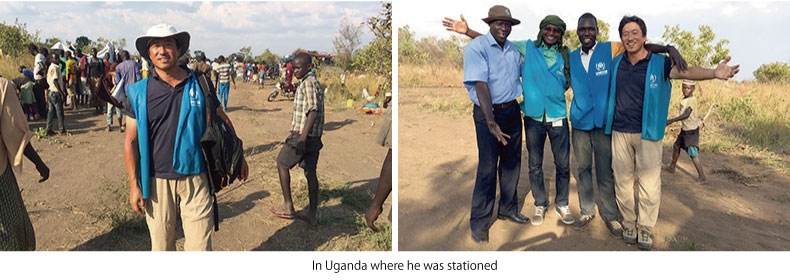
Profile
Junichiro Kosaka
1994 B.A. in Arts and Sciences (Social Sciences),
1996 M.A. in ICU Graduate School of Public Administration
Junichiro Kosaka entered the Division of Social Sciences, College of Liberal Arts, ICU, and advanced to the Graduate School of Public Administration. After completing master's program, he moved to the Department of International Relations, London School of Economics, in 1997 to study about the integration of Europe. He joined UNHCR in 2006 and has been mainly engaged in external relations. He has also joined the United Nations Disaster Assessment and Coordination (UNDAC) team organized in response to the Great East Japan Earthquake in March 2011 and the Japan Platform (a NGO) on short period assignments. Recently he was sent to Uganda as a member of an Emergency Response Team to support refugees from South Sudan.
